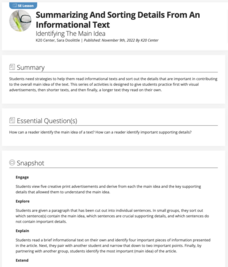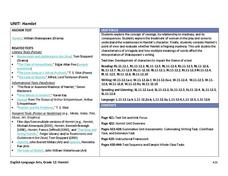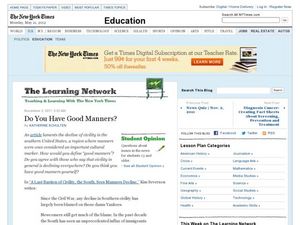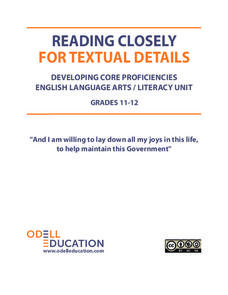K20 LEARN
Summarizing and Sorting Details from an Informational Text: Identifying the Main Idea
Scholars participate in two activities that teach them to identify the main idea and key supporting details in informational text. Partners create a visual that reflects the main idea and key supporting details in an informational text...
Read Works
Plymouth Colony
Read about the tumultuous beginning to the United States with an informational text passage about Colonial America. As young researchers peruse an article about the arrival of the Mayflower, the settlers' relationship to the neighboring...
Curated OER
Writing Summaries
Practice summary writing with informational texts. Young readers create summaries after reading magazine articles, newspaper articles, or other forms of informational texts. Readers use the GRASP strategy (read text, write what you...
Curated OER
Rockefeller's Revenge: Exxon and Mobil Unite
Study the impact and possible outcomes of the Exxon-Mobil merger in your language arts, social studies, or economics class. Secondary learners evaluate a series of graphs, write a paragraph interpreting the data, and engage in class...
Curated OER
How Often Do You Interact with People of Another Race or Ethnicity?
Is interacting with people from different backgrounds part of a well-rounded education? A big question awaits young readers as they explore two New York Times articles that discuss modern-day segregation, population statistics, and...
Louisiana Department of Education
Unit: Hamlet
Encourage readers to determine if Hamlet's madness is actually divinest sense. Class members analyze the words of the play before studying related texts, including T.S. Eliot's "The Love Song of J. Alfred Prufrock," scenes from...
Odell Education
Reading Closely for Textual Details: "We, as a people, will get to the promised land!"
Take another look—there are probably more details than readers realize. Scholars analyze nine texts in a five-part unit that contains 21 activities to find textual details. Activities include close reading, independent reading,...
Curated OER
Do You Have Good Manners?
Who cares about manners anyway? According to the New York Times, Mrs. Mason does. Learners read and consider an article which addresses the decline of manners and the impact it has on society. They answer seven critical thinking...
What So Proudly We Hail
Life, Liberty, and the Pursuit of Happiness: A Lesson on the Declaration of Independence
What does it mean to say that a right is unalienable? How did the founding fathers convey this revolutionary concept in the Declaration of Independence? Engage in a close reading and analysis of the Declaration of Independence, and...
Curated OER
Pay to Play?
Lead your class in a discussion about how they believe money influences politics. After reading "Go Ahead, Try to Stop K Street" from the New York Times, they evaluate the claims in the article about the current lobbyist scandal in...
Odell Education
Reading Closely for Textual Details: "And I am willing to lay down all my joys in this life..."
Look closely, some details are hidden! Scholars learn how to find attributes by first examining characteristics in illustrations and then move to locating details in text with close reading. The teacher models good practices for...
Institute for the Professional Development of Adult Educators
Using Context Clues with Signal Words
When you come across an unfamiliar word in a text, do you skip it and move on? Practice using context clues to identify words you don't know with a thorough set of language arts lessons. The resource reinforces close reading and critical...
Scholastic
Consider the Source
Who is more trustworthy when it comes to marijuana: a high school student, or The National Institute on Drug Abuse? Sources matter when reading informational text. Help teenagers discern which facts are true with an activity that focuses...
National Endowment for the Humanities
The Debate in the United States over the League of Nations: Five Camps: From Voices of Consent to Voices of Dissent
Students explore and discuss Woodrow Wilson's concepts for peace and the League of Nations. They understand efforts made to foster American support for the League and discuss the opposition shown in the Senate.
Constitutional Rights Foundation
The Lincoln-Douglas Debates — Springboard to the White House
The Lincoln-Douglas Debates saw two primary political candidates debating seven different times about one of the most important social movements in United States history. Middle and high schoolers read an article that describes the...
NPR
Is There Really an Immigration Line?
If you've ever looked at the US immigration system, you know that it is complex and a source of controversy. An insightful lesson plan encourages learners to conduct their own analyses of the US immigration system by asking them to...
Newspaper Association of America
Community Connections with Geography and the Newspaper
Understanding geography and government begins at the local level. Using maps and the parts of a newspaper, a unit plan introduces the concept of community. It starts with the creation of classroom and school maps, and then moves through...
Student Handouts
A New Presidency
Use this quick informational text to give your class an introduction to President Bill Clinton and Hillary Rodham Clinton, first lady at the time of the events in the text. Individuals or partners can read the brief text and respond to...
Polk Bros Foundation
Answer the BIG Question with Cited Examples and Evidence
Close up your unit of study with an examination of one of the guiding or essential questions as it relates to what your class has studied and other research. Class members first write down the question. Then they note down information...
University of Kansas
Newspaper in the Classroom
Newspapers aren't only for reading—they're for learning skills, too! A journalism unit provides three lessons each for primary, intermediate, and secondary grades. Lessons include objectives, materials, vocabulary, and procedure, and...
Curated OER
In God We Trust; All Others Pay Cash
Learners review their knowledge on the First Amendment. After reading an article, they identify specific church and state issues. Using the Internet, they research President Bush's proposal from a specific point of view. They summarize...
Scholastic
Dear Miss Breed
This compelling plan based on the letters in the book Dear Miss Breed engages readers in learning what it was like for Japanese Americans following the attacks at Pearl Harbor. After reading the letters, young scholars will partake in...
Newspaper Association of America
The News
Young journalists learn about topics such as newspaper ethics, parts of a newspaper, credible sources, and different types of articles. The lesson empowers individuals and gives them the capability to express their voices through the...
Museum of Tolerance
Documents That Shape Society
The Bill of Rights is a foundational document of American democracy, much like the Nuremberg Laws were a foundational document of the Reichstag of Nazi Germany. But that's where their similarities end. Engage high schoolers in a...

























